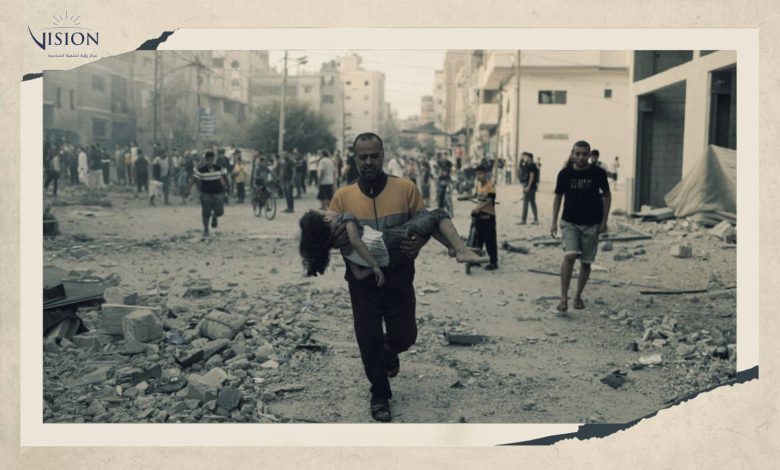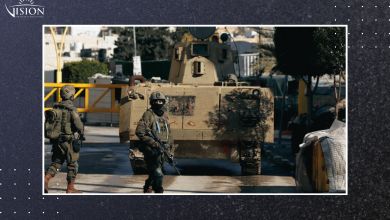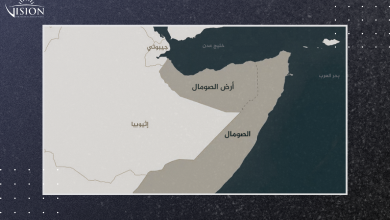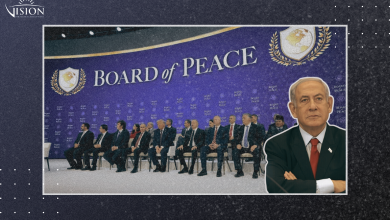Western Perspectives on the Genocidal War in Gaza: An Analysis of Divergences and Constraints

Murad Abu Al-Baha
A year has passed since Israel launched its war on the Gaza Strip, marked by international reports documenting extensive crimes against civilians in the region. The conflict witnessed widespread acts of indiscriminate killings and the systematic destruction of vital infrastructure, including governmental, educational, healthcare, and civil facilities. Despite these atrocities, no tangible progress has been made toward a ceasefire agreement to alleviate the suffering of the people in Gaza. In this context, the need to examine the stances of Western countries toward the aggression against Gaza becomes critical. Notably, international courts, primarily established under Western auspices, have begun to review cases filed against the occupation and its leaders, addressing egregious violations of international law during its offensive on Gaza. These actions fall within the framework of allegations of genocide against Palestinian civilians. Furthermore, numerous reports from United Nations-affiliated organizations and human rights groups have consistently, since the onset of the war, highlighted blatant violations of human rights and the perpetration of indiscriminate killings by the occupying forces against Palestinians in the Gaza Strip.
It is apparent to any informed observer the special treatment Israel receives from the West in general, and the unwavering support from the United States in particular. The historical context of Western support for the establishment of a national homeland for Jews in Palestine is well-documented. Initially, the Zionist project aligned with British interests, backed by European colonial powers, under the so-called “buffer state” concept, which was a part of the reorganization of the Ottoman Empire’s remnants and an attempt to address the so-called “Jewish question.” However, divergences in Israeli and British interests during World War II, coupled with the astute understanding of international dynamics by Israeli leaders in the post-war era, facilitated the establishment of robust relations with the United States, which was emerging as a global superpower. This strategic alliance granted Israel an extensive network of unparalleled support and diplomatic protection from the United States on the international stage. This was achieved through the development of expansive lobbying networks within the corridors of American decision-making, enabling Israel to consistently evade the implementation of international resolutions that were contrary to its interests, primarily through the guarantee of American vetoes in the United Nations Security Council.
Since the 1940s, the United States has almost entirely adopted the Israeli position, with few exceptions when conflicts of interest arose, such as during the 1956 Suez Crisis. In the international arena, the U.S. has vigorously defended Israel, providing legal and political cover for its actions and breaches of international law. Recently, the United States has repeatedly used its veto power in the Security Council to block resolutions calling for a ceasefire in Gaza. According to statistical data, the United States has employed its veto power 114 times up to the end of 2023, of which 80 instances were to shield Israel from condemnation, while 34 vetoes targeted resolutions supporting Palestinian rights. The magnitude of U.S. military assistance to Israel over the decades is also evident, particularly during the recent war on Gaza. Under a memorandum of understanding signed in 2016, the U.S. committed to an annual military aid package of $3.8 billion over a ten-year period. Various reports detail the scope and volume of munitions supplied by the U.S. to Israel, with the cumulative total of American military aid provided since Israel’s founding in 1948 reaching approximately $124.3 billion by the end of 2023. It is also worth noting that Germany stands as the second-largest arms supplier to Israel, following the United States.
Amid the unlimited military and political support extended by the United States to the occupying state, the U.S. has attempted to refine its image on the international stage by persistently emphasizing its significant efforts to deliver humanitarian aid to civilians in Gaza. Official spokespersons have repeatedly stressed the importance of Israel permitting more humanitarian assistance to enter the Gaza Strip. However, in practice, the U.S. has made no genuine efforts to compel Israel to implement such measures.
Throughout the year-long conflict, certain inconsistencies have become apparent in the approaches adopted by various Western nations, particularly when contrasted with the overarching policy stance of the United States on the issue. While Western countries broadly condemned the Palestinian resistance’s attack on October 7th, labeling it as an illegitimate and unjustifiable act of terrorism, many Western leaders expressed unconditional solidarity with Israel, affirming its legitimate right to what they termed self-defense. In the aftermath of the Hamas attack, numerous Western leaders visited Israel, offering solidarity and support, with some even proposing the formation of an international coalition to eradicate Hamas, as advocated by the French president during his visit to Israel. However, Israel’s subsequent assault on Gaza, characterized by excessive use of force, indiscriminate killings, and the large-scale destruction of vital infrastructure, including actions leading to the starvation of civilians, prompted a shift in the stance of some Western nations. These countries openly declared that Israel’s right to self-defense does not justify the scale of the killing and devastation occurring in the Gaza Strip.
The European Union’s High Representative for Foreign Affairs and Security Policy, Josep Borrell, has repeatedly emphasized his unequivocal rejection of Israel’s actions against civilians in Gaza. Addressing a session of the United Nations Security Council, Borrell highlighted that the use of starvation as a weapon of war against Palestinian civilians in Gaza cannot be tolerated. He underscored the necessity of condemning the situation in Gaza with the same firmness as the condemnation of the events in Ukraine. Furthermore, Borrell pointed out Israel’s evasion of its legal responsibilities, which stands in contradiction to numerous reports issued by international organizations on the matter. He reiterated the need for sincere efforts to achieve a two-state solution. Borrell’s stance extended further when he announced European efforts aimed at imposing sanctions on Israeli ministers who incite hatred against Palestinians and promote ideas that clearly violate international law. He condemned the massacres committed by Israel against civilians in Gaza, emphasizing that the world cannot normalize the humanitarian catastrophe unfolding in the Gaza Strip.
Borrell’s stance does not fully represent the entire European position and appears to contrast sharply with that of the President of the European Commission, Ursula von der Leyen, who extended diplomatic and economic support to Israel. She even raised the Israeli flag over the European Commission building in Brussels and traveled to Tel Aviv a week after the October 7th attack to express her solidarity with Israel. This move exposed internal contradictions within Europe, as the President of the European Council, Charles Michel, remarked that von der Leyen’s unconditional support for Israel had harmed the European Union’s reputation.
Meanwhile, the French Foreign Minister, speaking on the risks of a potential large-scale Israeli assault on the city of Rafah, warned that Palestinians in the Gaza Strip faced the danger of forced displacement. He officially stated that France opposed any Israeli military operation in Rafah, emphasizing the need for Israel to allow unconditional humanitarian aid to Palestinians. He further stressed that the failure to deliver aid signaled the complete failure of the international community. Despite these warnings, Israel proceeded with its attack on Rafah.
European permanent members of the United Nations Security Council voted in favor of a resolution proposed on March 25, 2024, by the ten non-permanent members of the Council, calling for a ceasefire in the Gaza Strip during the holy month of Ramadan in 2024. The resolution received the support of 14 out of the 15 Council members, with the United States abstaining from the vote. Israel, however, did not adhere to the resolution, citing the lack of enforcement measures, as it was passed under Chapter VI of the UN Charter rather than Chapter VII, and did not recognize the situation as a threat to international peace and security.
The divergence in Western approaches became even more pronounced with advanced decisions taken by several European nations on May 28, 2024, concerning the recognition of the State of Palestine. Norway, Spain, and Ireland officially announced their recognition of Palestine, with the Spanish Prime Minister stating that his country would not recognize any changes to the 1967 borders unless agreed upon by both Palestinians and Israelis. He emphasized that Spain’s recognition of the Palestinian state aligns with UN resolutions and that the only viable path to peace is the two-state solution. The Spanish Deputy Prime Minister further called for an immediate ceasefire in Gaza, the prosecution of those responsible for war crimes, and an end to what she described as genocide. Ireland’s Foreign Minister urged Israel to respect the sovereign decisions of democratic states that recognized Palestine, while the Norwegian Foreign Minister remarked that this recognition marked a turning point in Norwegian-Palestinian relations. Two days after the announcements by the three European states, a fourth—Slovenia—also declared its recognition of Palestine, followed by Malta, which expressed its intention to do the same.
The divergence within the Western bloc regarding approaches to the Palestinian issue in general, and the recent war on the Gaza Strip in particular, is not a new phenomenon. Currently, 13 out of the 27 European Union member states recognize the State of Palestine. Some of these states, including Malta, Cyprus, the Czech Republic, Slovakia, Hungary, Romania, Bulgaria, and Poland, had extended recognition to Palestine prior to their accession to the European Union. However, Sweden became the first EU member to formally recognize Palestine in 2014, followed by Norway, Spain, Ireland, and Slovenia, which extended their recognition during the latest aggression on Gaza. Additionally, it is worth noting that both the United Kingdom and Australia have announced that they are considering the possibility of recognizing the State of Palestine. The French President has also suggested that France’s recognition of Palestine is feasible, though contingent on the appropriate timing.
On April 18, 2024, the United Nations Security Council voted, with a majority of 12 out of 15 members, on a resolution proposed by the Algerian delegate on behalf of the Arab group, calling for full membership of the State of Palestine at the United Nations. France was among the nations that voted in favor, while the United Kingdom and Switzerland abstained. The United States, however, exercised its veto power, being the sole opponent of the resolution, arguing that the establishment of a Palestinian state should emerge from direct negotiations with Israel, not through unilateral actions at the United Nations.
These internal contradictions within the Western bloc are evident in certain contexts, particularly in the unwavering support the United States provides to Israel on military, economic, and political fronts, a stance that does not enjoy unanimous backing within the Western system. On numerous occasions, the United States has stood alone in offering limitless support to Israel. The differences in handling the Palestinian issue are starkly visible through declarations by various European nations rejecting many of Israel’s measures against Palestinians. Some European countries have even taken actions that openly diverge from the U.S. stance, such as recognizing the State of Palestine and condemning aggression against the Palestinian people. Furthermore, there have been public statements from prominent UN figures within the Western system, including the UNRWA Commissioner-General and the Executive Director of UNICEF, among others, denouncing the killings, starvation, and excessive use of force by Israel against the Palestinian population.
Many of the Western stances that have openly condemned the crime of genocide in the Gaza Strip, and diverged from the U.S. approach, have largely remained within the realm of symbolic declarations and moral positions. They have not translated into concrete measures to halt the atrocities occurring in the region. It is evident to any informed observer of the international system that the influence and weight of states vary significantly on the global stage, and the United States continues to act as the world’s enforcer. However, this American role appears less effective without comprehensive backing from the broader Western bloc. The internal divergences within the Western alliance can, in fact, exert substantial influence if coordinated and mobilized by the concerned party—in this case, the Palestinians through effective leadership.
The absence of legitimate Palestinian political leadership and a robust institution that represents the aspirations of the Palestinian people on the international stage hinders their ability to act systematically and coherently. This vacuum renders the objective of rallying Western and non-Western opposition to the ongoing crimes in Gaza—now persisting for over a year—elusive. As a result, every effort exerted on the international front appears isolated and ineffective. In the absence of this Palestinian institution, which ought to lead the people across their various factions and mobilize both popular and official international opinion, especially from within the Western framework that controls key global institutions, systematic and strategic efforts remain out of reach. Without a well-structured official discourse and organized action, the immense sacrifices of Palestinians and the ongoing bloodshed continue without yielding any significant political gains or hope for a better near future.





